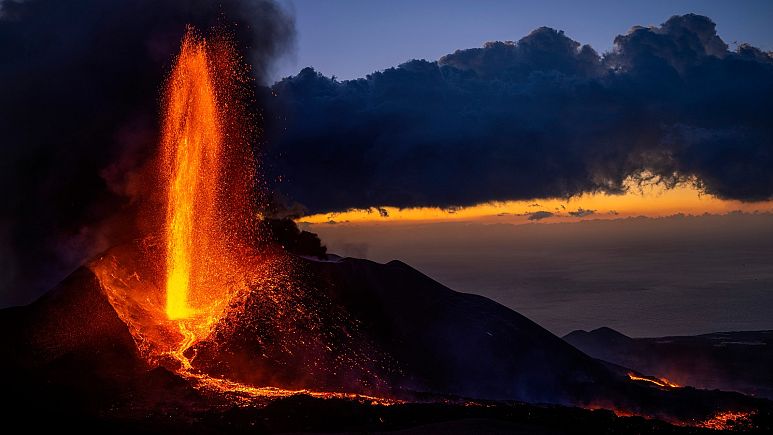La Palma volcano: Fresh lockdowns amid record-breaking 85 days of activity
La Cumbre Vieja has marked 85 days of continuous activity, the longest time a volcano has been erupting on the island since records began.
It began spewing out lava and toxic gas on the Spanish island of La Palma on September 19.
More than 1,200 hectares of land have been affected by the molten rock streams and 3,000 buildings destroyed.
After several days of low-level activity, the volcano suddenly came alive again on Sunday, blowing a large cloud of ash into the sky.
On Monday, a third of the island's residents were once again ordered to stay at home due to "extremely adverse" air quality.
Around 24,500 citizens in Los Llanos de Aridane, El Paso, and Tazacorte were told to shut their windows and turn off air conditioning units to avoid inhaling toxic fumes. Schoolchildren were also told to remain inside as all outdoor activities were suspended.
The lockdown order was later lifted after just a few hours due to an improvement in air quality data.
Scientists say volcanic eruptions are unpredictable. Spanish experts had initially said the La Palma eruption could last up to three months.
Mariano Hernández, the island’s senior government official, described the volcano as “stable” in recent days.
“The fact is that all the key indicators have been low,” he told Spanish public broadcaster RTVE. “But the scientists won’t say exactly when it might come to an end.”
He said experts continue to measure the number and magnitude of earthquakes in the area and local sulfur dioxide levels.
From Saturday to Sunday, authorities recorded 24 earthquakes, but none was felt by local people.
Despite the damage, no injuries or deaths have been directly linked to the eruption. Much of the area covered by rivers of lava, which are dumping molten rock into the sea, is farmland.
Life has continued largely as normal on most of La Palma, where a section of the southwestern side is hardest hit.
The volcanic Canary Islands, which are a favourite warm-weather vacation site for Europeans, lie off Africa’s northwest coast.
The Spanish government has allocated €130 million to help residents manage the volcano's destruction.
Source: Euronews







